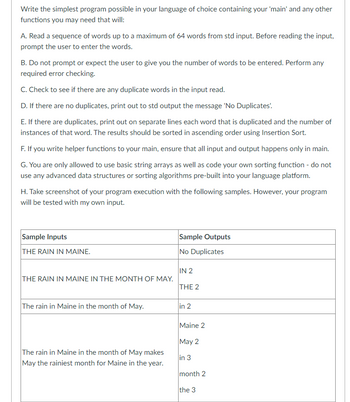
Database System Concepts
7th Edition
ISBN: 9780078022159
Author: Abraham Silberschatz Professor, Henry F. Korth, S. Sudarshan
Publisher: McGraw-Hill Education
expand_more
expand_more
format_list_bulleted
Concept explainers
Question
in c++ fast please

Transcribed Image Text:Write the simplest program possible in your language of choice containing your 'main' and any other
functions you may need that will:
A. Read a sequence of words up to a maximum of 64 words from std input. Before reading the input,
prompt the user to enter the words.
B. Do not prompt or expect the user to give you the number of words to be entered. Perform any
required error checking.
C. Check to see if there are any duplicate words in the input read.
D. If there are no duplicates, print out to std output the message 'No Duplicates'.
E. If there are duplicates, print out on separate lines each word that is duplicated and the number of
instances of that word. The results should be sorted in ascending order using Insertion Sort.
F. If you write helper functions to your main, ensure that all input and output happens only in main.
G. You are only allowed to use basic string arrays as well as code your own sorting function - do not
use any advanced data structures or sorting algorithms pre-built into your language platform.
H. Take screenshot of your program execution with the following samples. However, your program
will be tested with my own input.
Sample Inputs
THE RAIN IN MAINE.
THE RAIN IN MAINE IN THE MONTH OF MAY.
The rain in Maine in the month of May.
The rain in Maine in the month of May makes
May the rainiest month for Maine in the year.
Sample Outputs
No Duplicates
IN 2
THE 2
in 2
Maine 2
May 2
in 3
month 2
the 3
Expert Solution
arrow_forward
Step 1
Your C++ program is given below as you required with an output.
Trending nowThis is a popular solution!
Step by stepSolved in 4 steps with 2 images

Knowledge Booster
Learn more about
Need a deep-dive on the concept behind this application? Look no further. Learn more about this topic, computer-science and related others by exploring similar questions and additional content below.Similar questions
- Classes are a way of grouping data and functions together in C++. True or Falsearrow_forwardwhat is static_cast<> in C++?arrow_forwardThe question should be done in C++, please give explanation and running result. 1. Let’s write a function that compares 2 strings and returns true if they were identical, false otherwise. The signature of this function should be: bool word_diff(std::string word1, std::string word2); For example: std::string str1 = "Hello World";std::string str2 = "hEllO World";std::string str3 = "World";std::string str4 = "Hello World";bool result = word_diff(str1, str2); // Falsebool result = word_diff(str1, str3); // Falsebool result = word_diff(str1, str4); // True 2. Now let’s follow a classical approach to compare the content of 2 files. We should open each file, read their content word by word and compare them until a first mismatch occurs.Let’s implement a function called classical_file_diff that takes 2 arguments each of which is a file name and returns a boolean indicating whether the 2 files are identical or not. The signature of this function should be: bool…arrow_forward
- Write aprogram in C++ that takes input the number 203212 and prints the number in reverse order. Built-in functions are not allowed. input : 203212arrow_forwardWrite a value function in a C++ program that has two double parameters, calculates their difference, and returns the absolute value of the difference?arrow_forwardNeed help with C++ Question.arrow_forward
arrow_back_ios
arrow_forward_ios
Recommended textbooks for you
 Database System ConceptsComputer ScienceISBN:9780078022159Author:Abraham Silberschatz Professor, Henry F. Korth, S. SudarshanPublisher:McGraw-Hill Education
Database System ConceptsComputer ScienceISBN:9780078022159Author:Abraham Silberschatz Professor, Henry F. Korth, S. SudarshanPublisher:McGraw-Hill Education Starting Out with Python (4th Edition)Computer ScienceISBN:9780134444321Author:Tony GaddisPublisher:PEARSON
Starting Out with Python (4th Edition)Computer ScienceISBN:9780134444321Author:Tony GaddisPublisher:PEARSON Digital Fundamentals (11th Edition)Computer ScienceISBN:9780132737968Author:Thomas L. FloydPublisher:PEARSON
Digital Fundamentals (11th Edition)Computer ScienceISBN:9780132737968Author:Thomas L. FloydPublisher:PEARSON C How to Program (8th Edition)Computer ScienceISBN:9780133976892Author:Paul J. Deitel, Harvey DeitelPublisher:PEARSON
C How to Program (8th Edition)Computer ScienceISBN:9780133976892Author:Paul J. Deitel, Harvey DeitelPublisher:PEARSON Database Systems: Design, Implementation, & Manag...Computer ScienceISBN:9781337627900Author:Carlos Coronel, Steven MorrisPublisher:Cengage Learning
Database Systems: Design, Implementation, & Manag...Computer ScienceISBN:9781337627900Author:Carlos Coronel, Steven MorrisPublisher:Cengage Learning Programmable Logic ControllersComputer ScienceISBN:9780073373843Author:Frank D. PetruzellaPublisher:McGraw-Hill Education
Programmable Logic ControllersComputer ScienceISBN:9780073373843Author:Frank D. PetruzellaPublisher:McGraw-Hill Education

Database System Concepts
Computer Science
ISBN:9780078022159
Author:Abraham Silberschatz Professor, Henry F. Korth, S. Sudarshan
Publisher:McGraw-Hill Education

Starting Out with Python (4th Edition)
Computer Science
ISBN:9780134444321
Author:Tony Gaddis
Publisher:PEARSON

Digital Fundamentals (11th Edition)
Computer Science
ISBN:9780132737968
Author:Thomas L. Floyd
Publisher:PEARSON

C How to Program (8th Edition)
Computer Science
ISBN:9780133976892
Author:Paul J. Deitel, Harvey Deitel
Publisher:PEARSON

Database Systems: Design, Implementation, & Manag...
Computer Science
ISBN:9781337627900
Author:Carlos Coronel, Steven Morris
Publisher:Cengage Learning

Programmable Logic Controllers
Computer Science
ISBN:9780073373843
Author:Frank D. Petruzella
Publisher:McGraw-Hill Education